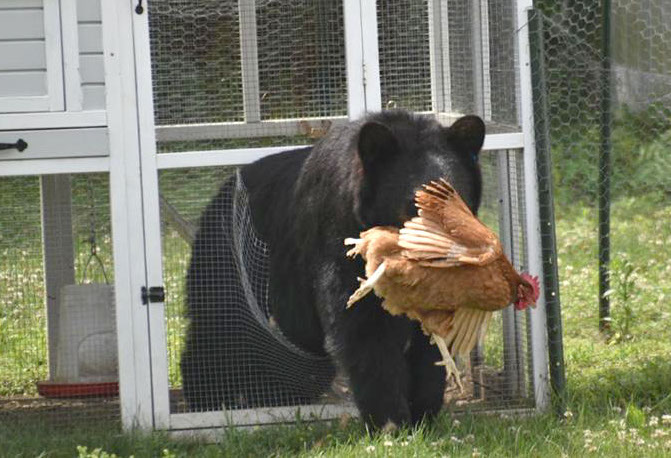The N.C. Wildlife Resources Commission (WRC) is encouraging livestock and poultry owners to protect their animals from black bears.
Black bears tend to consume a mostly plant-based diet and are attracted to livestock feed, such as grains and corn. However, they are omnivores and opportunists and will feed on eggs, small livestock (such as chickens and rabbits) and larger animals (including goats, miniature ponies and alpacas). Unprotected livestock, eggs and feed are easy pickings to a hungry bear, especially since they look and smell like food and are loaded with easily accessible calories. Raising livestock of any species in bear country requires BearWise® husbandry practices, even for small-scale, backyard operations.
“It’s one of the most common calls about bears that we get and it’s also one of the most preventable,” said WRC BearWise Coordinator Ashley Hobbs. “Especially in the summer and fall months, I respond to many calls from the public reporting their goat herd or chicken flock have been completely wiped out by a bear. Unprotected coops and pens provide accessible food all in one convenient spot.”
Just three chickens (minus the feathers) total about 4,500 calories – almost two days’ worth of nutrition for a bear. A dozen eggs (with shells) is 900 calories.
“While the number of reports is on the rise, the reported property damage and loss of livestock is usually preventable,” says Hobbs.
To keep bears from accessing livestock and livestock feed as a food source, it is important to properly secure attractants.
“Bears are quick learners and highly food motivated. Once they discover an easy food source, like a chicken coop, they will come back and visit others,” says WRC Black Bear Biologist Jenna Malzhan. “This can be heartbreaking and costly for people and puts bears at risk of harm by food-conditioning bears to humans and livestock.”
BearWise is an Association of Fish & Wildlife Agencies program dedicated to helping people live responsibly with bears. It offers information and instruction on protecting chickens and helpful information for livestock owners and beekeepers. Proper husbandry practices are key to coexistence, and BearWise recommends the following proactive measures:
- Always store livestock feed and pet food away from the animals in a locked, bear-resistant shed or building, or in a bear-resistant container.
- Place livestock pens and bee hives at least 50 yards away from wooded areas and other cover that could protect bears from view. Confine livestock in buildings and pens, especially during lambing or calving seasons.
- Consider bringing livestock, particularly smaller animals, inside at night.
- Remove carcasses from the site and dispose of them by rendering or deep burial.
- Install electric fencing or own a guard animal.
Standard chicken and rabbit coop designs aren’t strong enough to keep out a determined bear. Some bears are so fond of larval bees and honey they will seek out hives in their home range. BearWise recommends harvesting honey as soon as possible to reduce the appeal of apiaries (bee hives). Electric fencing works best to keep out bears and prevents damage to hives, coops and goat or rabbit structures.
To learn more about safely raising livestock in bear country, please visit BearWise.org and contact NCWRC’s Wildlife Helpline for assistance at 866-318-2401, Monday-Friday, from 8 a.m. to 5 p.m.







